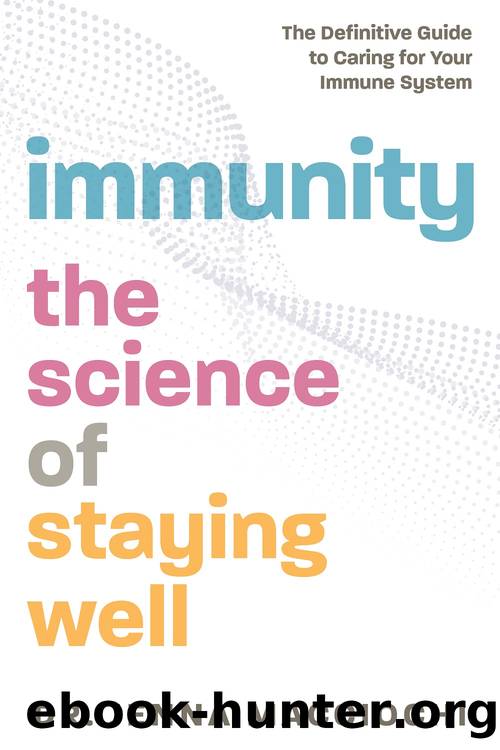Immunity by Jenna Macciochi

Author:Jenna Macciochi
Language: eng
Format: epub
Publisher: The Experiment
Published: 2020-08-10T20:29:23+00:00
Do you have leisure sickness . . .
A Dutch research group coined the term “leisure sickness” in 2001 to describe the supposed phenomenon in which certain people, particularly workers under pressure, fall ill as soon as they take a break. A number of explanations have been put forward to explain this so-called leisure sickness, each with a common red thread: stress!
The pre-holiday buildup with its associated increased workload and preparations, particularly for people in high-pressure jobs/lives, inflicts a psychological stress. We may be more susceptible to catching an infection in those stressful weeks leading up to a holiday, but if the immune system is also constantly being signaled by cortisol to suppress inflammation, we may not see any symptoms. Only when that stress-induced immune suppression lifts—the moment our holidays start—can the immune system provide the familiar symptoms of the sickness, due to the combination of pathogens living in the body, along with the absence of the anti-inflammatory signal. In other words, you might fall ill before your vacation and only notice it when you start to relax. However, we can’t exclude the possibility that change of routine, sleep patterns, jet lag, food, and perhaps more alcohol than normal can also contribute. Even just sitting on an airplane a few seats away from someone with a cold can lead to an 80 percent chance that you will catch it, too.
. . . Or are you burnt out?
The term “burnout” was coined in the 1970s by psychologist Herbert Freudenberger and is used to describe the consequences of severe stress in doctors and nurses, or those in care roles who, in helping others, would often end up burnt out—exhausted, listless, and unable to cope. Nowadays, burnout receives constant media attention. It even made the World Health Organization’s International Class of Diseases as an Occupational Phenomenon in 2019.27 No longer reserved for those in helping professions, or for the dark side of self-sacrificing your free time to care for loved ones, it can affect anyone, from stressed-out careerists and celebrities to overworked employees and homemakers. The term is applied to a set of symptoms, rather than a clearly defined illness. Since my own brush with burnout, I’ve been left wondering: If we are the most knowledgeable species on the planet, why do we get burnout?
Symptoms of burnout
Strictly speaking there is no such diagnosis as burnout and medical professionals have yet to agree on what it actually is. But it is considered to have a wide range of symptoms:
Feelings of depletion and exhaustion: sufferers feel drained and emotionally exhausted, unable to cope, tired and down, and lacking energy. Physical symptoms include pain and stomach or bowel problems.
Alienation from (work-related) activities: work becomes more and more stressful and frustrating. Sufferers may start being cynical about their working conditions and their colleagues. At the same time, they may increasingly distance themselves emotionally, and start feeling numb about their work.
Reduced performance and professional efficacy: mainly affected are everyday tasks at work, at home, or when caring for family members.
Download
This site does not store any files on its server. We only index and link to content provided by other sites. Please contact the content providers to delete copyright contents if any and email us, we'll remove relevant links or contents immediately.
The DNA Book by DK(618)
The End of Food Allergy by Kari Nadeau MD PhD & Sloan Barnett(603)
Extra Life by Steven Johnson(520)
Unlocking Eden: Revolutionize Your Health, Maximize Your Immunity, Restore Your Vitality by Belt Daniel & Horn Joe(512)
Your Brain Is Always Listening by Dr. Daniel G. Amen(508)
The Hospital by Brian Alexander(485)
The Covid Survival Guide: What the Virus Is, How to Avoid It, How to Survive It by Rowell David(475)
The Spike by Mark Humphries;(457)
How to Sleep by Rafael Pelayo(451)
The Low-FODMAP IBS Solution Plan and Cookbook by Rachel Pauls(451)
Better Living Through Neurochemistry - A guide to the optimization of serotonin, dopamine and the neurotransmitters that color your world by James Lee(434)
Thrivers by Michele Borba Ed. D(423)
The Big Book of Baby Names by Marissa Charles(414)
Linda Goodman's Love Signs by Linda Goodman(413)
Stroke For Dummies by John R. Marler(401)
The Miracle Pill by Peter Walker(398)
Immunity by Jenna Macciochi(395)
The Hashimoto's AIP Cookbook: Easy Recipes for Thyroid Healing on the Paleo Autoimmune Protocol by Emily Kyle MS RDN CLT HCP & Phil Kyle Chef(384)
Pandemics: A Very Short Introduction (Very Short Introductions) by Christian W. McMillen(382)
